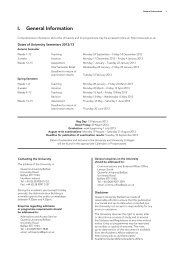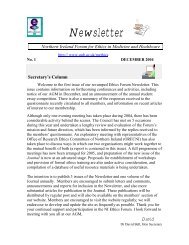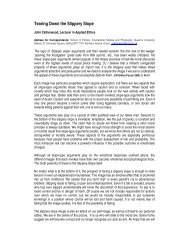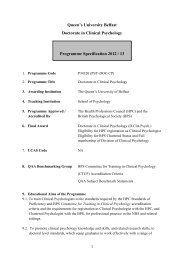Therapeutic Confidentiality and the Provision of Psychological ...
Therapeutic Confidentiality and the Provision of Psychological ...
Therapeutic Confidentiality and the Provision of Psychological ...
Create successful ePaper yourself
Turn your PDF publications into a flip-book with our unique Google optimized e-Paper software.
healthcare practitioners working with under 16's (DoH, 2000; Ford <strong>and</strong><br />
Kessel, 2001) 7 . Instead, <strong>the</strong> preferred policy focus will be on developing<br />
age-appropriate psychiatric accommodation for young people, especially<br />
for <strong>the</strong> seriously under-resourced 16-18 age group. This latter issue has<br />
been correctly highlighted by successive Mental Health Act Commission<br />
Reports as requiring urgent attention. The contradictions in wider<br />
Government policy, however, remain unresolved on <strong>the</strong> contentious<br />
issue <strong>of</strong> Gillick <strong>and</strong> young people's rights to confidential <strong>the</strong>rapy. The<br />
Government has a clearly stated public commitment to <strong>the</strong> 1989 UN<br />
Convention on <strong>the</strong> Rights <strong>of</strong> <strong>the</strong> Child, with <strong>the</strong> appointment <strong>of</strong> a Minister<br />
for Children in Engl<strong>and</strong>. However it seems that, in <strong>the</strong> present dash to<br />
construct an over-arching strategic reform <strong>of</strong> psychiatric care, a decisive<br />
opportunity for introducing some joined up policy on <strong>the</strong> Gillick principle<br />
is all too likely to be overlooked.<br />
Nor<strong>the</strong>rn Irel<strong>and</strong> Review <strong>of</strong> Mental Health <strong>Provision</strong> for Children <strong>and</strong><br />
Adolescents<br />
In <strong>the</strong> specific context <strong>of</strong> <strong>the</strong> current review <strong>of</strong> mental healthcare<br />
provision, <strong>the</strong>re are a number <strong>of</strong> suggested developments which could<br />
be considered, based on <strong>the</strong> model <strong>of</strong> children’s rights described above,<br />
in terms <strong>of</strong> <strong>the</strong>ir rights respectively to welfare, participation <strong>and</strong><br />
independence. These suggestions could be linked to <strong>the</strong> detailed <strong>and</strong><br />
comprehensive survey <strong>of</strong> current provision in Nor<strong>the</strong>rn Irel<strong>and</strong><br />
undertaken for <strong>the</strong> Children’s Law Centre (O’Rawe, 2003) 10 . The<br />
following fairly modest proposals are all drawn from recent reviews or<br />
reports on this issue in Engl<strong>and</strong> <strong>and</strong> Wales, <strong>and</strong> are set out as potential<br />
aims for <strong>the</strong> future service. (Specific sources are numbered, <strong>and</strong> appear<br />
as a separate section in <strong>the</strong> references at <strong>the</strong> end <strong>of</strong> <strong>the</strong> article.)<br />
Proposals for Nor<strong>the</strong>rn Irel<strong>and</strong> Review <strong>of</strong> Mental Health <strong>Provision</strong><br />
for Children <strong>and</strong> Adolescents<br />
Welfare:<br />
43
















